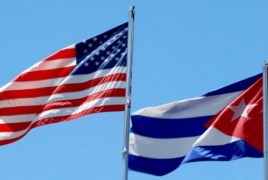U.S. officially removes Cuba from terror blacklist May 30, 2015 - 11:35 AMT PanARMENIAN.Net - The U.S. officially lifted its designation of Cuba as a state sponsor of terror on Friday, May 29, the State Department said, clearing a hurdle to re-establishing diplomatic ties between Washington and Havana. President Barack Obama recommended to Congress last month that Cuba be removed from the list, triggering a 45-day congressional notification period in which lawmakers could have challenged the decision. Though Obama’s Cuba policy has opponents on both sides of the aisle, lawmakers didn’t take steps to challenge Cuba’s removal from the list, the Wall Street Journal reports. The State Department said it was still at odds with many of Cuba’s policies, but those policies don’t support its continued inclusion on the list. “While the United States has significant concerns and disagreements with a wide range of Cuba’s policies and actions, these fall outside the criteria relevant to the rescission of a state sponsor of terrorism designation,” State Department spokesman Jeff Rathke said, according to the Journal. Countries on the list—which now include only Iran, Sudan and Syria—are banned from U.S. arms and exports sales as well as from U.S. economic assistance in addition to a wide variety of additional financial restrictions. The Cubans have pointed to the terrorism designation as a barrier to going ahead with plans to reopen embassies. Cuba and Washington haven’t had embassies in each other’s countries since 1961. The U.S. action Friday helps pave the way to elevating lower-level diplomatic posts in Washington and Havana into embassies, a first step in what will be a lengthy process to normalize ties after a decades-long Cold War freeze. Washington will keep other restrictions on Cuban trade and travel that are mandated by other laws. As part of the broader normalization, Obama has called on Congress to fully lift a U.S. embargo. There is no timetable for congressional action. The U.S. added Cuba to the list in 1982, citing Havana’s role in supporting leftist insurgents in Latin America. Its continued presence on the list was tied most recently to its provision of haven to the members of the Basque separatist group ETA as well as Colombia’s left-wing FARC rebel group. State Department officials said they conducted a thorough review to back their recommendation to remove Cuba from the list and received assurances from the Cuban government they wouldn't support terrorist activity in the future Cuba also harbors fugitives wanted in the U.S., including Joanne Chesimard, who is on the FBI’s Most Wanted Terrorists list for killing a New Jersey state trooper in 1973. Cuba granted her asylum after she escaped from prison in 1979. State Department officials said last month that Cuba had agreed to talk about fugitives as part of a broader dialogue on law enforcement issues. After the State Department’s review, Secretary of State John Kerry recommended to Obama that Cuba be removed from the list, triggering the 45-day congressional review period. Kerry on Friday signed an order removing Cuba formally. Azerbaijani authorities report that they have already resettled 3,000 people in the Nagorno-Karabakh town of Stepanakert. On June 10, Azerbaijani President of Azerbaijan Ilham Aliyev will leave for Turkey on a working visit. Azerbaijani President Ilham Aliyev arrived in Moscow on April 22 to hold talks with Russian counterpart Vladimir Putin. Authorities said a total of 192 Azerbaijani troops were killed and 511 were wounded during Azerbaijan’s offensive. Partner news |